Overview
We believe that cloud-based healthcare systems hold the key to a transformative future in healthcare delivery. With enhanced accessibility, cost-efficiency, improved data security, and facilitated interoperability among medical organizations, these systems are not just a trend; they are a necessity. Evidence shows that operational efficiencies, compliance with regulations, and the ability to adapt to evolving healthcare demands can significantly improve patient outcomes.
What’s holding your organization back from embracing this change? By integrating cloud solutions, we can collectively enhance our healthcare systems and ensure that we are prepared for the challenges ahead. Let us work together to harness these benefits and drive meaningful change in the healthcare landscape.
Introduction
In the rapidly evolving landscape of healthcare, we recognize that the integration of cloud technology is transforming how organizations manage patient data and deliver care. With the increasing demand for secure, efficient, and accessible healthcare solutions, platforms like Avato are stepping up to bridge the gap between legacy systems and modern applications. By prioritizing data security and regulatory compliance, our hybrid integration platform not only enhances operational efficiency but also empowers healthcare providers to make informed decisions that improve patient outcomes.
As the industry shifts towards cloud-based solutions, we understand that grasping the best practices, challenges, and future trends of this technology is essential for organizations aiming to thrive in a competitive environment.
What’s holding your team back from embracing this transformation? Let us partner with you to navigate these complexities and unlock the full potential of cloud technology in your organization.
Avato: Secure Hybrid Integration for Healthcare Systems
Our hybrid integration platform is meticulously crafted to securely connect diverse medical systems, ensuring that sensitive patient information is managed with the highest level of security. By employing sophisticated encryption methods and adhering to stringent medical regulations, we facilitate seamless information transfer between legacy systems and modern applications. This integration is vital for medical organizations striving to enhance operational efficiency while safeguarding information integrity.
The security features of our platform are particularly crucial in the management of health information. By enabling robust data analytics and real-time monitoring, we empower medical providers to effectively identify groups of individuals for essential services, such as palliative care referrals. This capability not only enhances patient outcomes but also aids medical organizations in meeting regulatory compliance requirements.
Successful implementations of our platform in medical settings underscore its effectiveness. For instance, Umpqua Health’s initiative during the Oregon wildfires showcased how innovative solutions can tackle environmental health challenges while ensuring community resilience. Such case studies highlight our platform’s role in advancing medical service delivery through secure and efficient information integration.
Expert opinions further reinforce the importance of secure data flow in medical integration. Leaders in the field assert that adaptability, as noted by Charles Darwin, is crucial for survival in the rapidly changing medical landscape. This adaptability is facilitated by our hybrid integration platform, which enables entities to respond swiftly to evolving demands and maintain a competitive edge.
Progress in medical information integration continues to advance, with our platform at the forefront. By focusing on security and efficiency, we establish ourselves as an essential participant in the medical industry, ensuring that organizations can navigate the complexities of contemporary information management while prioritizing safety and compliance.
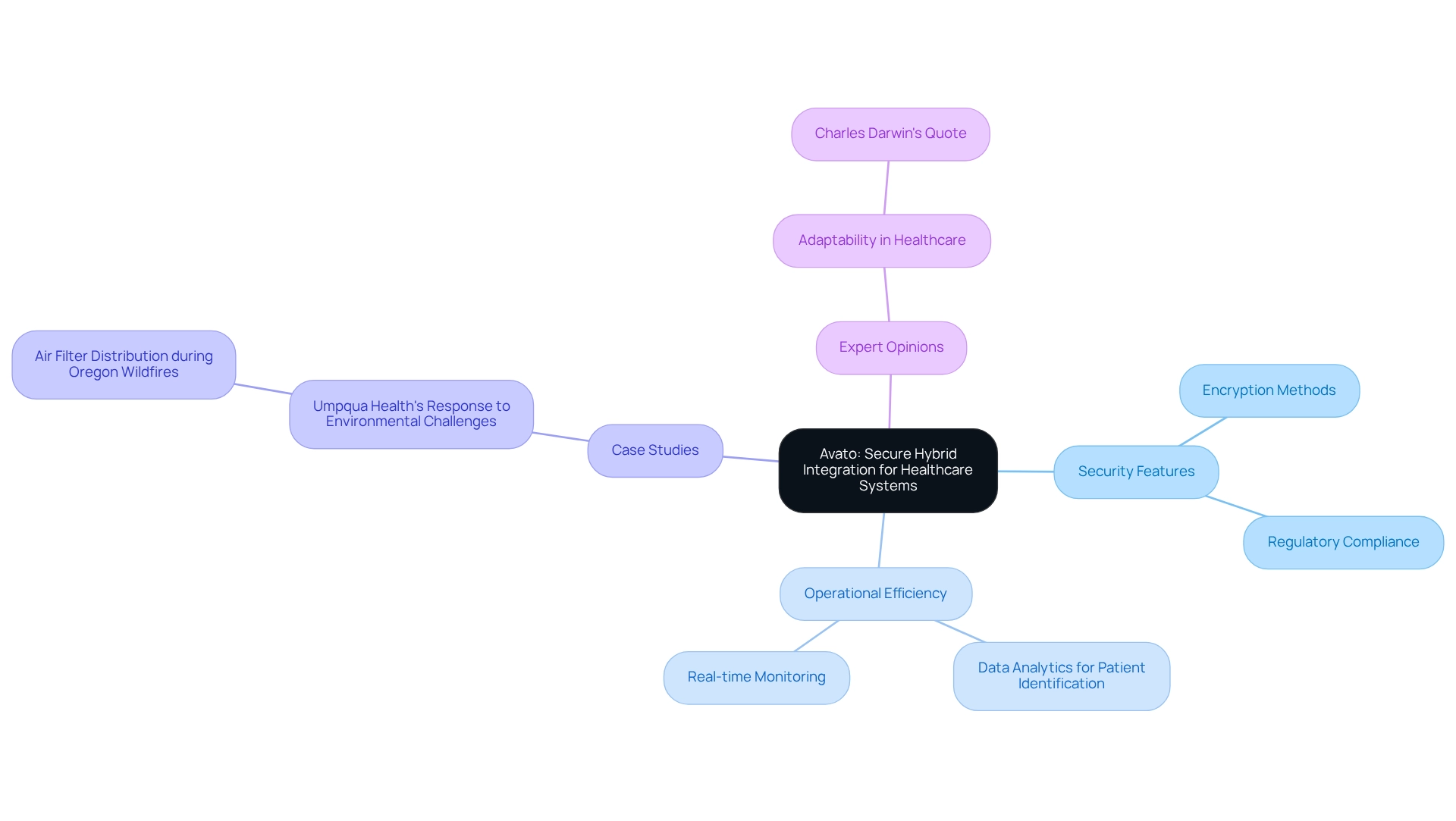
Enhanced Accessibility and Flexibility in Healthcare Delivery
Cloud based healthcare solutions empower us to access client information anytime and anywhere, significantly enhancing the delivery of care. This flexibility is essential for telehealth services, enabling us to provide remote consultations and support effectively. With approximately 30% of individuals already using computers or mobile devices to access their medical information, the demand for accessible medical services is unmistakable.
Furthermore, our cloud platforms can dynamically adjust resources based on patient demand, allowing us to respond swiftly to changing needs without incurring substantial costs or delays. For instance, we have effectively transformed our telemedicine services, now known as Teleconsultation, to offer extensive coverage for our members utilizing virtual medical services. This initiative reflects our broader commitment to improving member access to essential services, aligning with the increasing trend towards telehealth.
The incorporation of cloud based healthcare solutions not only enhances our operational efficiency but also supports ongoing initiatives to address access disparities in medical services. As telehealth progresses, our emphasis on accessibility and flexibility remains crucial, ensuring that we can deliver high-quality care in a rapidly evolving environment.
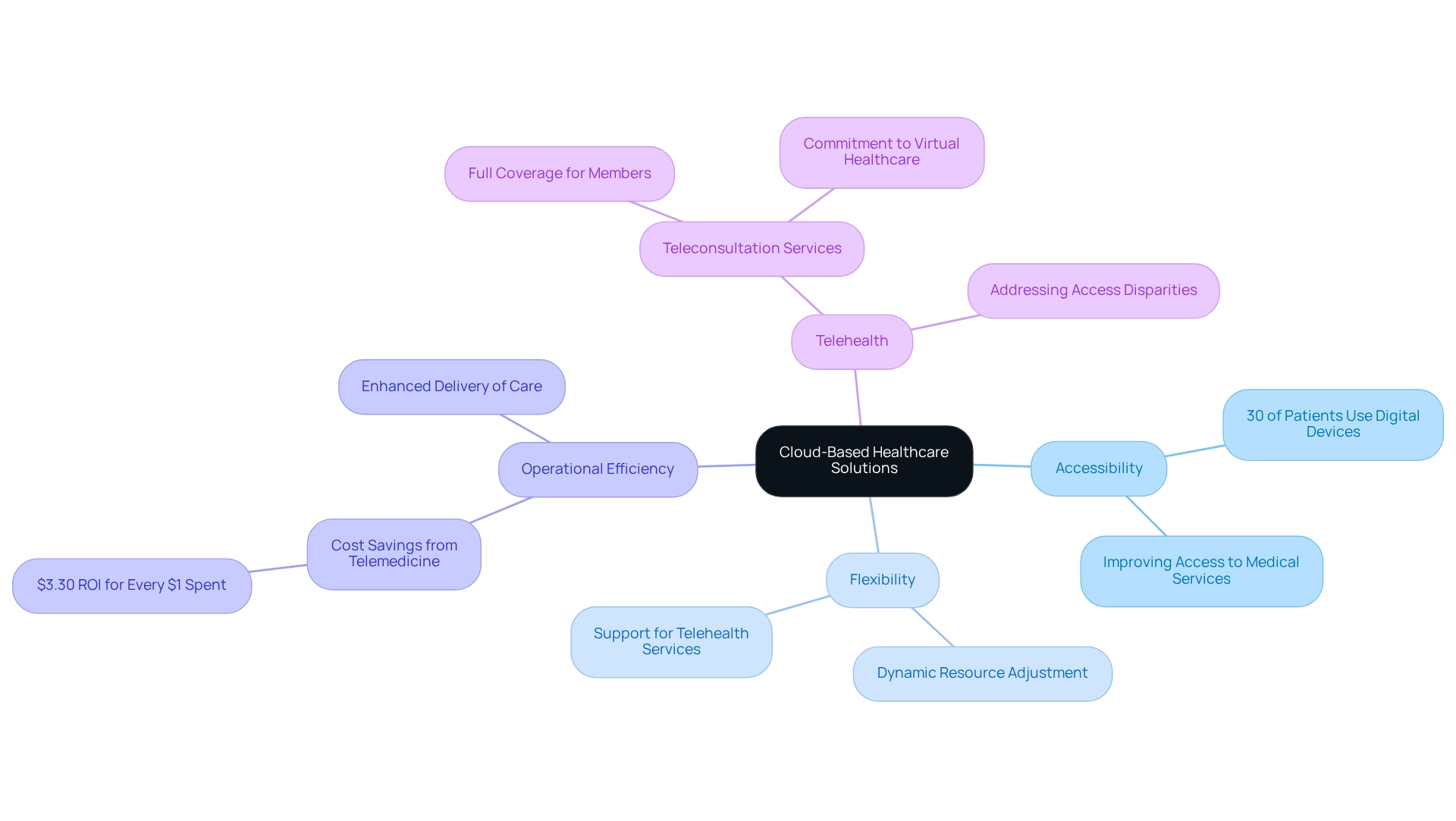
Cost-Efficiency and Scalability for Healthcare Organizations
Cloud based healthcare is revolutionizing the way medical facilities operate, significantly lowering operational expenses by minimizing the need for extensive physical infrastructure. This transformation not only leads to substantial savings but also empowers us to adopt a pay-as-you-go model, allowing for more effective budget management by paying solely for the resources we utilize.
The scalability of cloud solutions further enhances this cost-efficiency, enabling us to expand our capabilities seamlessly without the burden of substantial upfront investments. For example, we can look to the BC Provincial Health Services Authority, which successfully modernized its operations by integrating various legacy systems through Avato’s dedicated hybrid integration platform. This case exemplifies how we simplify the integration of disparate systems, enhancing business value.
The integration has resulted in improved operational capabilities and accelerated digital transformation. By leveraging cloud based healthcare, medical entities can reduce operational expenses while fostering growth and innovation. Moreover, budgeting for cloud based healthcare solutions not only facilitates immediate cost savings but also positions us for long-term financial sustainability in an ever-evolving environment.
What’s holding your team back from embracing this change? Let’s explore how we can partner to drive your organization forward.
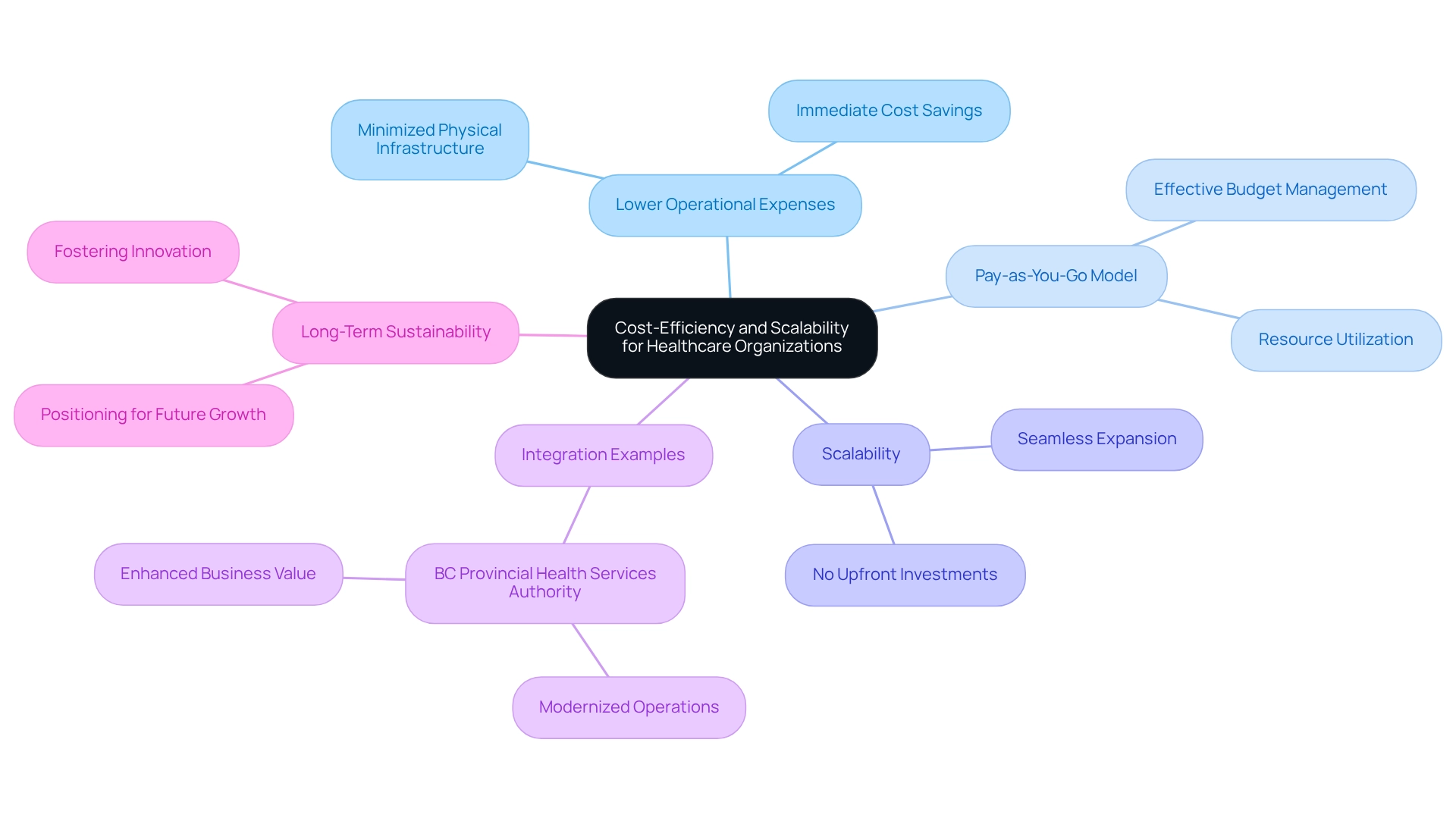
Improved Data Security and Compliance in Cloud Healthcare
Cloud based healthcare solutions are equipped with advanced security features such as encryption, robust access controls, and regular security audits. These measures assist us in adhering to HIPAA regulations and guarantee that patient information remains protected from breaches and unauthorized access. By leveraging cloud based healthcare technology, we can significantly enhance our security stance, allowing us to concentrate on delivering quality care while effectively managing compliance risks. A growing percentage of medical organizations utilizing cloud based healthcare solutions have achieved HIPAA compliance, demonstrating the effectiveness of these technologies in safeguarding sensitive information.
Furthermore, Avato’s hybrid integration platform accelerates secure system integration for medical services, ensuring that isolated systems and fragmented information are seamlessly connected. As the landscape of medical information security evolves, the incorporation of sophisticated protection features in our cloud based healthcare solutions is essential for safeguarding individual information and upholding confidence in the medical system.
What’s holding your team back from achieving the same level of security? Let us partner with you to navigate these complexities and enhance your compliance and security framework.
Facilitated Interoperability Across Healthcare Systems
Cloud computing significantly enhances interoperability by providing a cohesive platform that facilitates seamless information sharing across diverse medical systems. This capability is crucial for improving care coordination, as it empowers medical providers to access comprehensive individual information, irrespective of its storage location. Recent statistics indicate that an increasing number of medical providers are adopting cloud based healthcare solutions to obtain thorough individual information, signaling a shift towards more integrated care models.
At Avato, we recognize the pivotal role our dedicated hybrid integration platform plays in this transformation. By maximizing and extending the value of legacy systems, we break down data barriers and promote a holistic approach to care, ensuring that all relevant information is readily available to medical professionals. Our platform also offers real-time monitoring and alerts on system performance, which significantly mitigates costs associated with integration challenges. For example, the ThriveHealth iOS application, developed with the support of Mindbowser, exemplifies how cloud based healthcare platforms can enhance user engagement and care delivery. Joyce Nwatuobi, CEO of ThriveHealth, has noted the app’s positive reception, aligning with our mission to improve lives through better health management.
Furthermore, expert opinions underscore the importance of interoperability in cloud medical systems. Numerous medical providers have reported that cloud based healthcare not only streamlines information sharing but also enhances care coordination, leading to improved patient outcomes. Our hybrid integration platform guarantees 24/7 availability and reliability, which is essential for complex systems in the banking, medical, and government sectors. As the medical field continues to evolve, we anticipate that the adoption of cloud based healthcare platforms will accelerate, further dismantling barriers to information access and collaboration. This trend is vital for ensuring that individuals can trust their data remains consistent and accessible across various systems, ultimately fostering a more efficient and effective medical ecosystem.
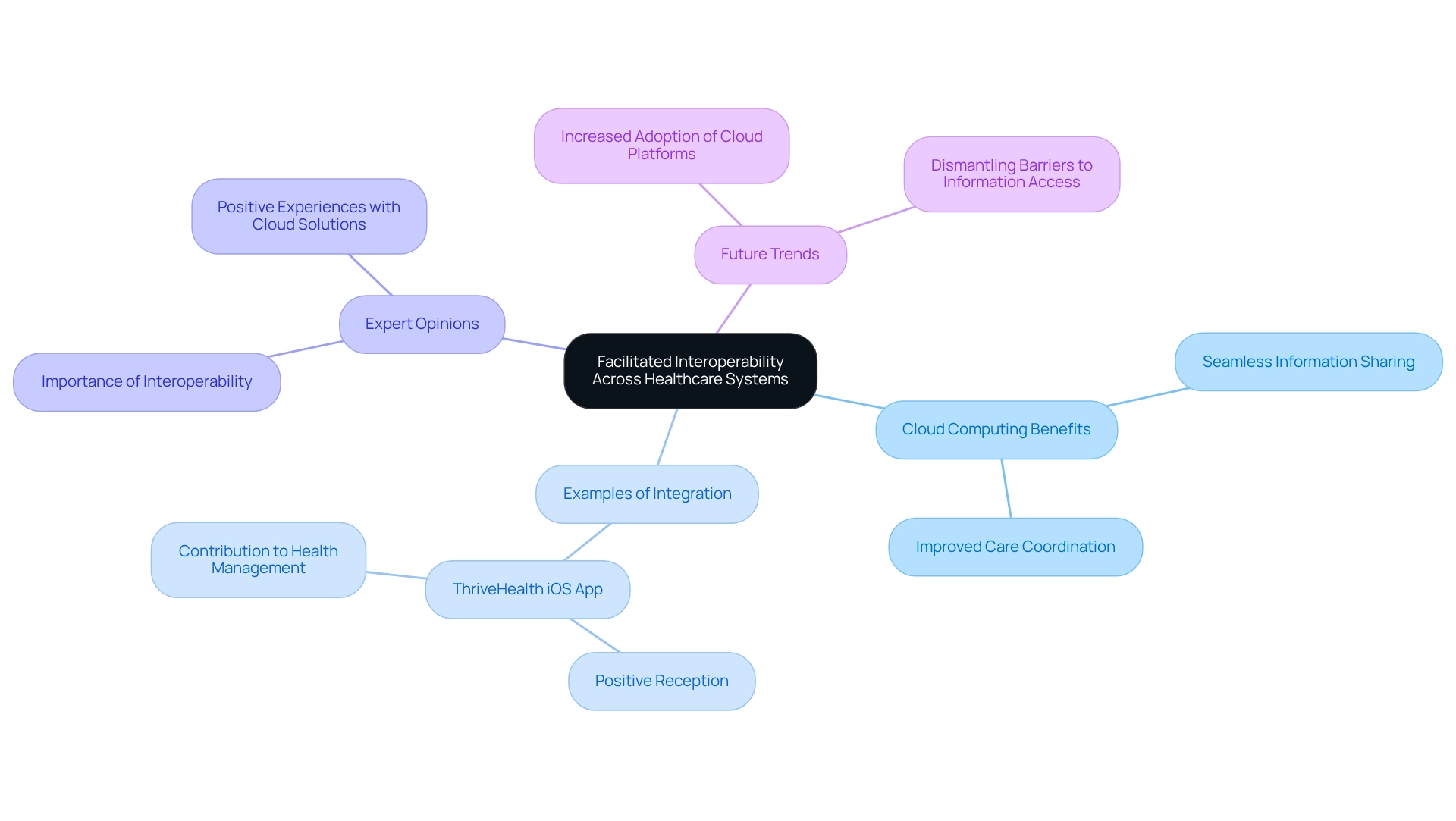
Advanced Analytics for Informed Decision-Making
Cloud-based healthcare analytics tools empower us to swiftly analyze extensive datasets, thereby transforming how medical organizations operate. By leveraging advanced analytics, we can quickly identify trends and make informed decisions that enhance patient care. For instance, in 2021, over 100 drug and biological submissions sent to the FDA utilized AI and machine learning, underscoring the pivotal role these technologies play in early disease detection and personalized treatment. This capability not only boosts operational efficiencies but also optimizes resource allocation, ultimately leading to higher quality care.
Recent data reveals that entities employing cloud based healthcare analytics in medical services experience significant improvements in patient outcomes, with many reporting enhanced decision-making processes. Furthermore, the importance of information ownership and accessibility cannot be overstated; when individuals manage their health information, they can engage more effectively with digital medical solutions. As we advance in the medical field, integrating sophisticated analytics tools will be essential for organizations striving to remain competitive and responsive to patient needs.
What’s holding your team back from harnessing these powerful tools? We invite you to explore how cloud based healthcare can transform your operations and elevate the standard of care you provide.
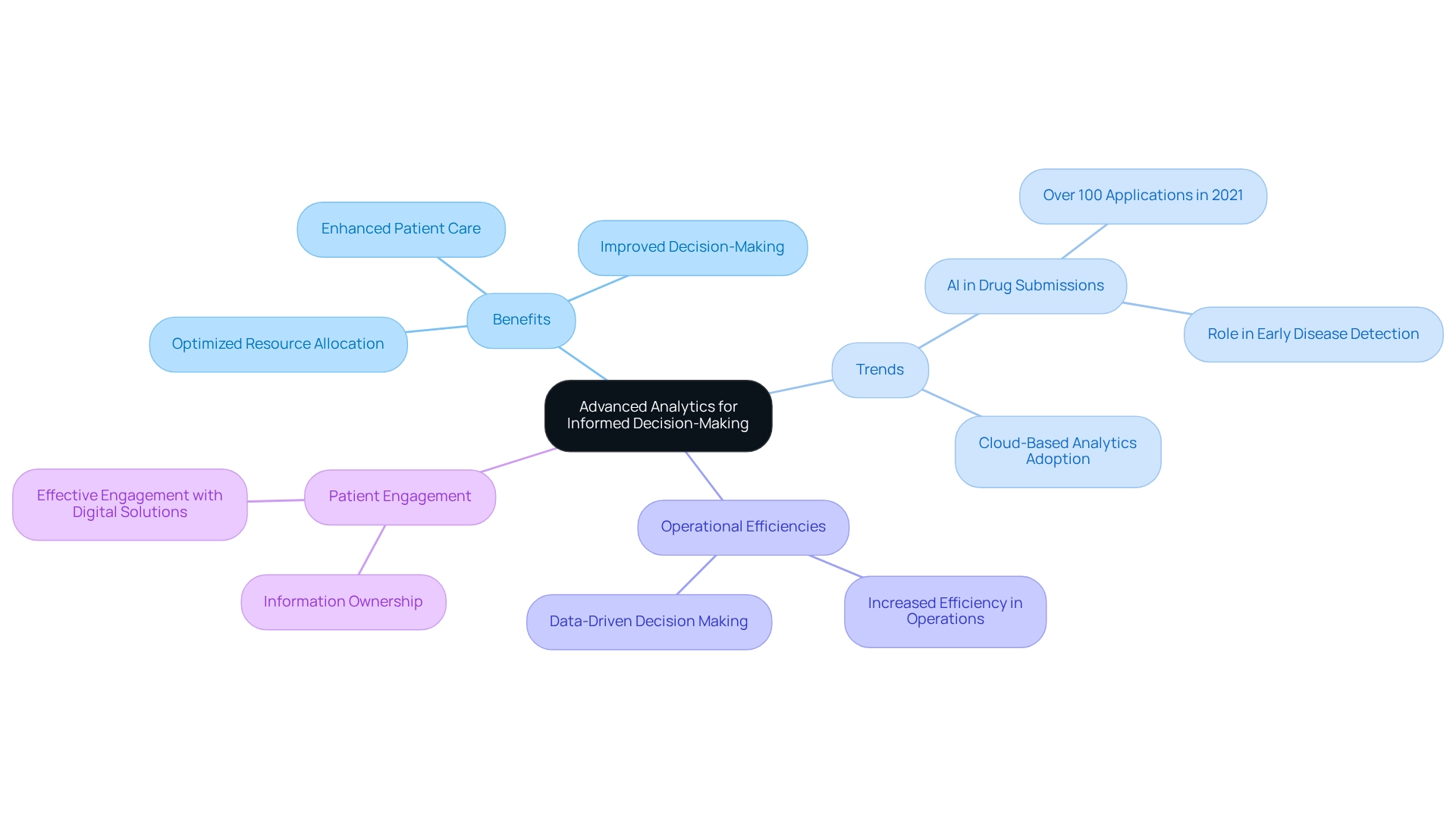
Disaster Recovery and Business Continuity in Healthcare
Cloud-based healthcare solutions provide robust disaster recovery alternatives that empower medical facilities to swiftly regain access to essential data and applications during interruptions. By implementing a comprehensive disaster recovery plan, we can significantly reduce downtime; studies reveal that organizations leveraging cloud disaster recovery experience an average downtime reduction of up to 70%. This capability is vital for maintaining continuity of care, thereby safeguarding patient health and safety in emergencies.
The importance of business continuity in the medical field is paramount, especially as our industry increasingly relies on digital solutions. By 2025, cloud technology will be critical in enabling medical organizations to respond effectively to crises. IT leaders assert that a well-structured disaster recovery strategy is essential for operational resilience, with many highlighting that ease of use and speed of recovery are top priorities when selecting disaster recovery solutions.
For instance, OTAVA’s S.E.C.U.R.E.™ Framework has proven instrumental in assisting healthcare providers in recovering swiftly from disruptions, ensuring rapid recovery times and minimal data loss. This framework exemplifies how tailored Disaster Recovery as a Service (DRaaS) solutions can help maintain compliance and protect care during emergencies.
Furthermore, statistics show that entities utilizing cloud disaster recovery solutions can significantly reduce operational downtime, which is crucial for upholding patient care standards. As our medical field continues to evolve, the integration of cloud-based healthcare technology will be essential for organizations aiming to enhance their disaster recovery capabilities and ensure business continuity. What steps are we taking to secure our operational resilience?
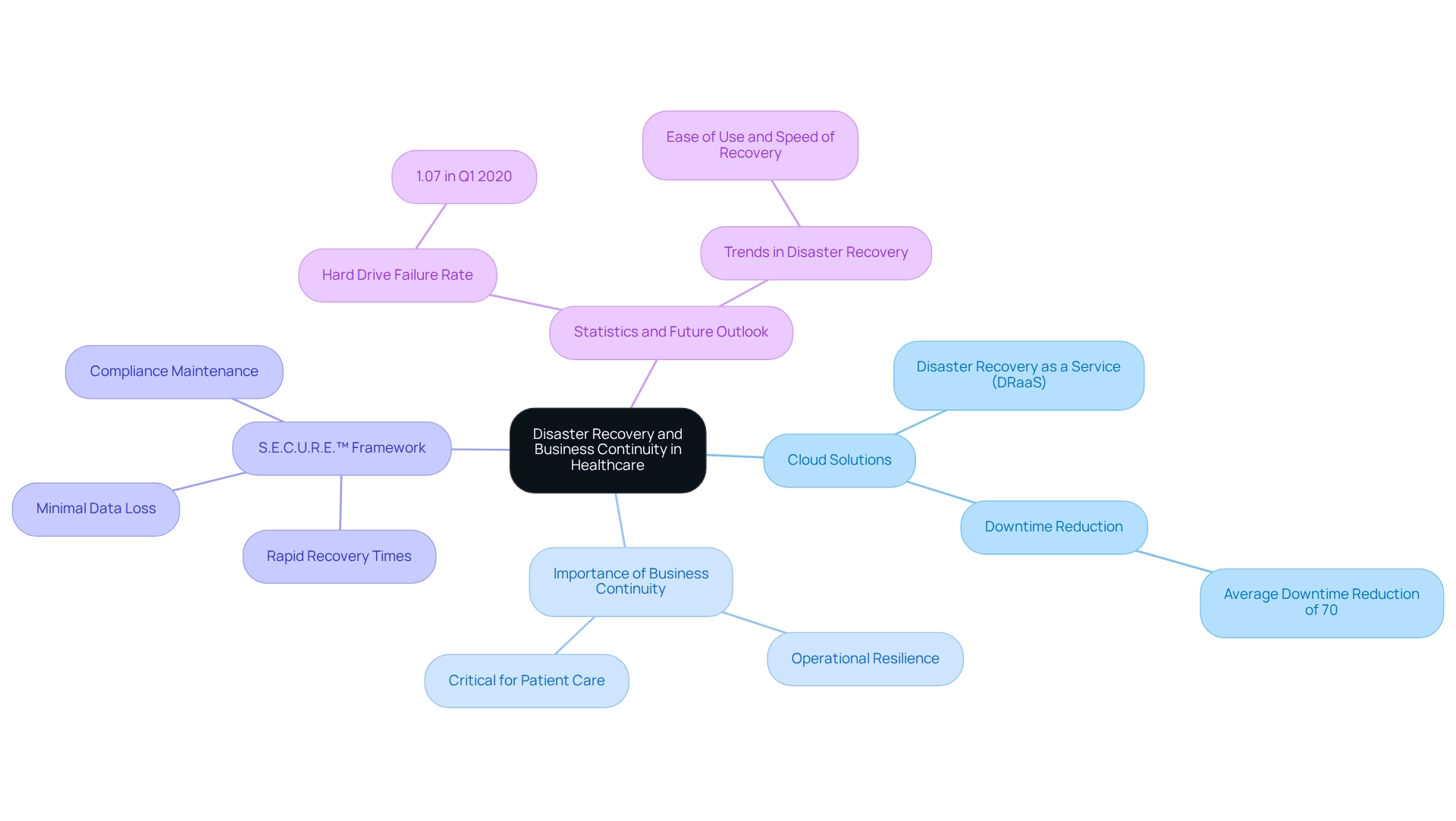
The Future of Cloud-Based Healthcare Systems
The future of cloud based healthcare systems is on the brink of remarkable transformations. We are witnessing the powerful integration of artificial intelligence (AI), machine learning, and telemedicine, which is set to revolutionize the industry. Our secure hybrid integration platform at Avato is tailored for secure transactions, guaranteeing 24/7 uptime and reliability—an essential requirement for complex systems in banking, medical services, and government. These advancements not only enhance care for individuals but also streamline operations and improve data management across medical organizations. As these entities increasingly embrace cloud based healthcare solutions, they will be strategically positioned to meet the dynamic demands of the industry and provide high-quality care.
AI and machine learning are pivotal in transforming individual care by enabling predictive analytics, personalized treatment plans, and effective resource allocation. For instance, medical providers can leverage AI algorithms to analyze extensive datasets, identifying patterns that lead to improved client outcomes. This capability is crucial as the industry shifts toward more data-driven decision-making processes.
Furthermore, the expansion of telemedicine, bolstered by cloud technology, facilitates remote patient monitoring and consultations, significantly enhancing access to medical services. This trend is particularly vital in light of global challenges, as emphasized by industry leaders who advocate for AI’s role in addressing urgent issues such as disease management and medical accessibility.
Statistics indicate that organizations implementing cloud based healthcare solutions experience heightened operational efficiencies, with many reporting increased uptime for critical integrations. This reliability is essential for sustaining continuous healthcare and operational integrity. Additionally, the unification of isolated legacy systems through our platform is a critical step in effective digital transformation, paving the way for a more cohesive and efficient medical environment. As we approach 2025, the convergence of AI, machine learning, and cloud technology will undoubtedly reshape the future landscape of medical services, fostering innovations that prioritize patient well-being and operational excellence. To fully harness these advancements, we encourage medical institutions to adopt Avato’s platform, ensuring seamless integration and enhanced service delivery.
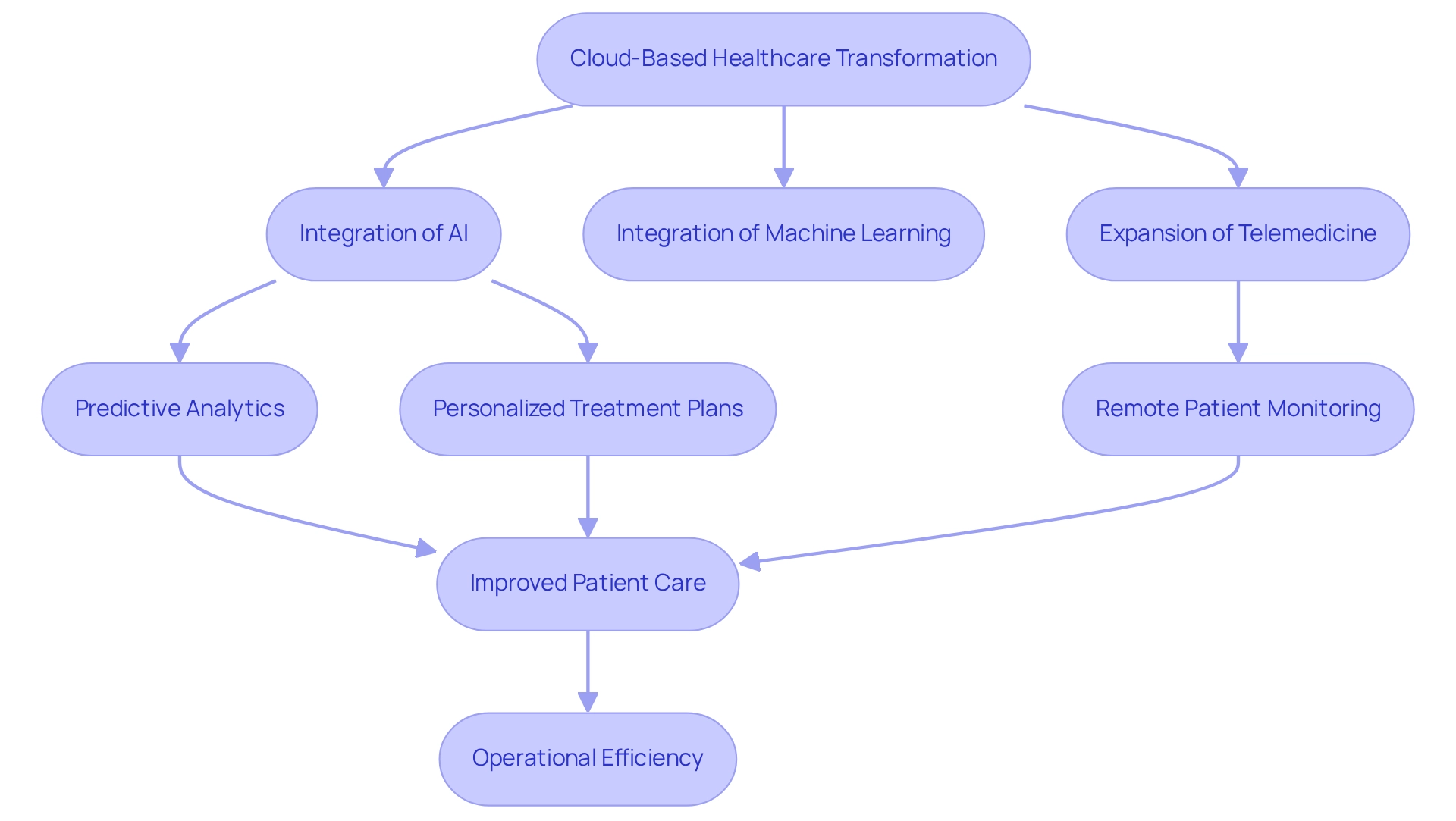
Best Practices for Implementing Cloud-Based Hospital Solutions
Implementing cloud based healthcare solutions requires adherence to several best practices to ensure success. We understand that conducting a thorough needs assessment is crucial; this step assists us in identifying specific requirements and customizing solutions accordingly. Compliance with healthcare regulations is also essential, as it safeguards patient data and maintains trust. We cannot overlook comprehensive training for our staff; equipping employees with the necessary skills ensures they can effectively utilize new technologies.
Engaging stakeholders throughout the transition process is vital. Their input can provide valuable insights and foster a sense of ownership, which is critical for adoption. Selecting a reliable cloud-based healthcare service provider is another key factor; partnerships with established companies can enhance operational capabilities and facilitate the successful implementation of cloud-based healthcare technologies. For instance, groups that have partnered with providers such as Nordic and AWS have reported smoother transitions and enhanced results.
Statistics show that entities prioritizing these best practices experience higher success rates in cloud adoption. Moreover, expert views emphasize the significance of strategic alliances in reaching medical objectives, reinforcing the idea that cooperation is crucial for managing the intricacies of cloud transitions. By adhering to these best practices, we can optimize the advantages of cloud based healthcare technology and guarantee a smooth shift to contemporary systems.
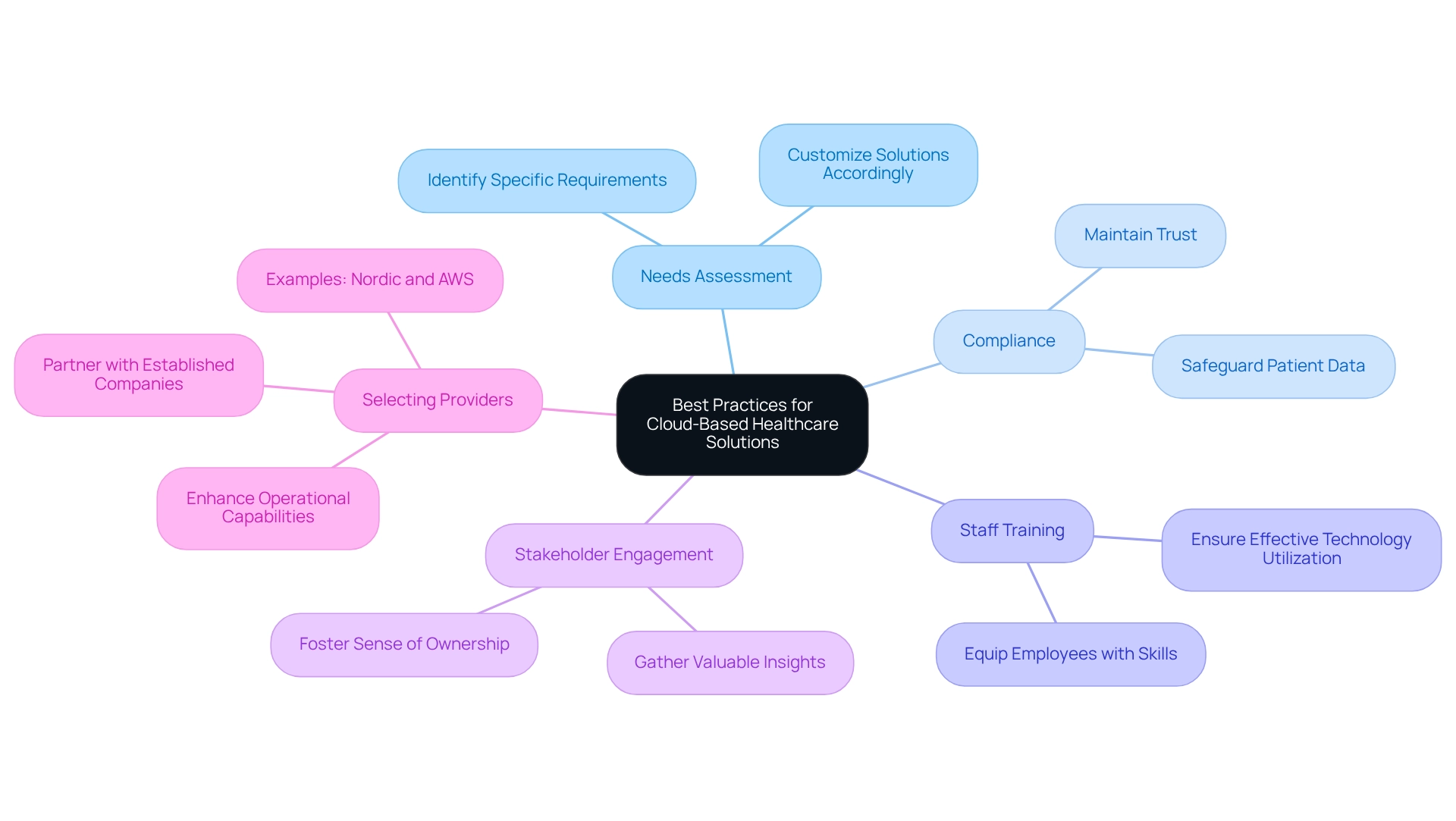
Challenges and Solutions in Cloud Computing for Healthcare
Cloud based healthcare presents significant advantages for medical organizations, but it also introduces challenges that require careful navigation. We face major issues such as:
- Security concerns
- Compliance with stringent regulations
- Hesitance to adopt new technologies
By 2025, the landscape of cloud medical service adoption is marked by escalating security threats; reports indicate a rise in spam emails and phishing attacks, which jeopardize sensitive data. Furthermore, a substantial number of medical institutions cite data protection as a primary barrier to cloud adoption, highlighting the urgent need for effective solutions.
To address these challenges, we must implement robust security measures, including:
- Advanced encryption protocols
- Multi-factor authentication
These measures are essential to protect patient information. Prioritizing compliance with regulations like HIPAA is essential for cloud based healthcare solutions, ensuring that they adhere to necessary standards. Additionally, fostering a culture of innovation and adaptability within our organizations will facilitate smoother transitions to cloud based healthcare systems.
Our hybrid integration platform, built on Red Hat’s open-source solutions, provides essential functionalities that directly tackle these challenges. With seamless integration features, we enhance information accessibility while maintaining compliance with regulatory standards. The platform’s advanced security capabilities help mitigate risks associated with breaches, making it an invaluable resource for medical institutions.
Case studies illustrate successful strategies employed by medical organizations that have effectively addressed data security issues. For example, some institutions have implemented comprehensive training programs for staff to identify and respond to potential security threats, significantly lowering the risk of breaches. By proactively confronting these challenges, we can unlock the full potential of cloud based healthcare technology, ultimately improving patient care and operational efficiency.
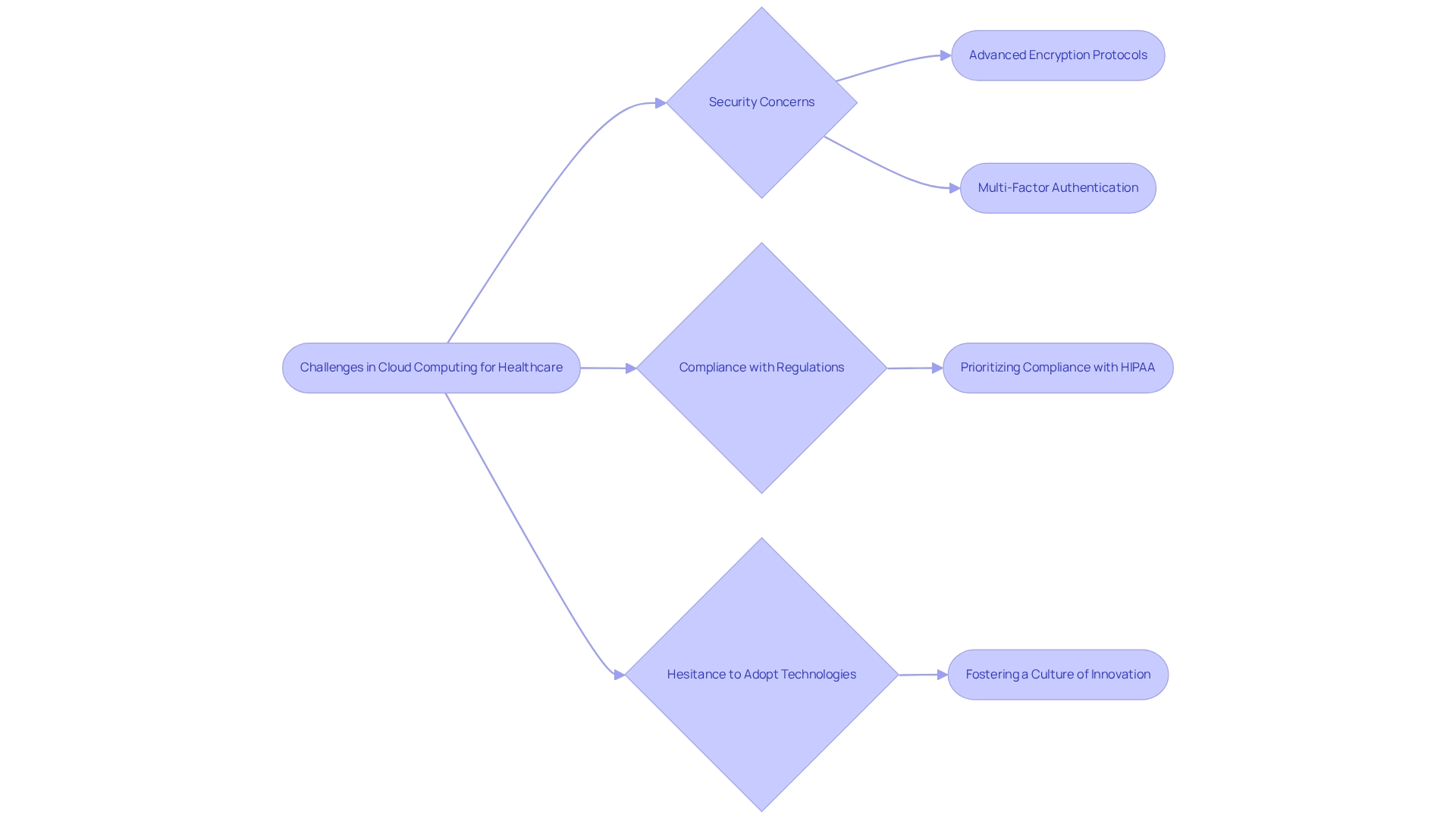
Conclusion
The integration of cloud technology in healthcare is not merely a trend; it represents a transformative shift that is redefining how we manage patient data and deliver care. Our hybrid integration platform stands at the forefront of this evolution, ensuring secure connectivity between legacy systems and modern applications. This facilitates seamless data flow while adhering to stringent regulations, empowering healthcare organizations to enhance operational efficiency, improve patient outcomes, and maintain compliance in an increasingly complex environment.
Furthermore, the flexibility of our cloud-based solutions allows healthcare providers to access critical patient information anytime and anywhere, which is vital for the growth of telehealth services. The cost-efficiency and scalability we offer enable organizations to minimize infrastructure expenses and adapt to fluctuating demands without significant upfront investments. As data security remains a pressing concern, our advanced cloud solutions, equipped with robust security features, help healthcare organizations safeguard sensitive information and meet compliance requirements effectively.
Looking ahead, the future of cloud-based healthcare systems promises to be driven by innovations such as AI and machine learning, which will further enhance patient care and operational efficiency. With best practices for implementation and strategic partnerships playing a crucial role in successful transitions, we encourage healthcare organizations to embrace these technologies to stay competitive and responsive to patient needs.
Ultimately, the ongoing evolution of cloud technology in healthcare is set to foster a more integrated, efficient, and patient-centered approach to care delivery. By navigating the challenges and leveraging the opportunities presented by cloud solutions, we can unlock the full potential of modern healthcare, ensuring that quality care remains accessible and effective in a rapidly changing landscape.

